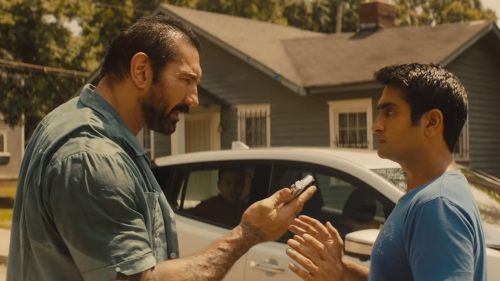THE BIG SICK: Comfort Fusion
“Based on a true story” movies acts as their own genre far too often. They re-create events exactly as they happened in the vein of a Wikipedia entry, with little regard for either coherence or audience unfamiliarity. That lack of familiarity is certainly the case in The Big Sick; neither comedian Kumail Nanjiani nor former therapist Emily V. Gordon are household names (not yet anyway), so the characters they’ve written for this real life retelling – up and coming comic Kumail Najiani and therapist-in-training Emily Gardener – may as well be crafted from the ground-up, at least to the general public. However, where the film skirts clear of the dangers of your average biopic is, in fact, expectation. Not in terms of actual chronology – none of the events of their true romance seem to have been vastly subverted – but rather, in terms of genre itself.
The Big Sick is both a traditional American Romantic Comedy and a Desi arranged-marriage family drama, rolled into something wholly unique thanks to real life almost-tragedy.
Spoilers to follow.
The paradigms within which the film works its magic would be intimately familiar to seasoned viewers of romantic entertainment. “Boy meets girl, they don’t get along, and then they do” is so familiar a formula that Rom Com parodies may as well be their own Netflix section, and there’s certainly no dearth of films where Desi characters, at home or abroad, find themselves caught between their liberating wants and traditional constraints, towing a line between the modern idea of a “love marriage” and their parents’ plans for them (in some cases even choosing the latter). They are both also, at their best, minor forms of rebellion despite how tired they seem at this stage. Harrys and Sallys navigate the social expectations of coupling and independence in a straight/white/western context, and their Desi cousins attempting to find reconciliation by choosing between cultural binaries.
The Big Sick leans in to plenty of familiar beats in either case, while foregoing just about as many. On the white Rom Com side, Kumail and Emily actually hit it off instantly. In fact, their initial disagreement is merely part of their banter, but everything from moments of self-reflection caused by public outbursts to equally public reconciliations fight their way in to the narrative even if they feel like they don’t belong. On the South Asian side, the many meetings of potential brides and awkward family dinners ensue with hilarity, as does the inevitable parental guilting over Kumail’s “betrayal” at an established low point, but there’s also no big moment of forgiveness or mutual cultural understanding.
Which isn’t to say the film has opted for some vaguely “it’s like real life, man!” musing over a satisfying narrative, but rather that its cultural trappings in either case are justifiably un-central to its central narrative. Kumail’s refusal and inability to tell his parents about Emily is the catalyst for their breakup, but it’s one of several red flags to her. To him, it was a lie that needed telling because he didn’t believe she would understand. She did, and that’s that. Both culture and culture clash rear their heads constantly, but they are neither irrelevant nor all-encompassing. They merely are, informing character decisions and relationships rather than acting as a central villain, with differences played for laughs. Kumail knows his place between these binary worlds, and the reconciliation he looks for isn’t in bringing them together. Similarly, Emily’s parents may have the odd awkward interaction with him (no matter where you’re from, that 9/11 joke absolutely kills), but their arc of acceptance has little to do with his race or religion. In fact, it doesn’t have much to do with Kumail himself.
Instead, our Pakistani protagonist acts as a sounding board for Terry and Beth’s rocky marriage when their daughter is in the hospital, fading quite literally into the background when necessary (even walking out of frame at one point!) and learning necessary lessons on the difficulties of love in return. As far as they’re concerned, the problem of marrying despite cultural differences is already solved – it was a continued issue through many family dinners for Ray Romano’s New Yorker and Holly Hunter’s Texan until it simply wasn’t – but the problems of any relationship won’t cease to be just because a union is deemed acceptable. Kumail telling his parents, even in a world where they come around instantly, won’t negate his need to look outside his own perspective when it comes to Emily, nor will it stop the journey he goes on from being exclusive to him since she is removed from most of the narrative.
The film’s plot involves Emily being placed in a medically induced coma shortly after she and Kumail break up. This hastens the arrival of the “status quo” future in-laws to look after their daughter, and circumvents their awkward introduction to the romantic outsider – if only to replace it with an even more awkward melting pot where any and all cultural misunderstandings are forcibly relegated to the small-talk category amidst a much more pressing issue. A different film might have even had Terry and Beth interacting with Azmat (Anupam Kher) and Sharmeen (Zenobia Shroff), but Kumail’s worlds remain separate except for a brief hello between Emily and his brother. This isn’t the story of two families coming together and finding common ground despite their differences. That narrative exists in some imagined sequel that we perhaps don’t need to see. It’s the story of those differences informing individual people and individual decisions, allowing them to exist independent of their cultures for a couple of hours while having to fight the inherent intrusiveness of said culture(s) in their lives.
Kumail doesn’t understand the “rules” of his native culture and doesn’t want any part of them. Instead, he attempts to break away from the mold of Desi Muslim tradition and craft his own American narrative as he figures things out. The rules he establishes - like the semi-joking “two day rule” where he can’t see Emily more than two days in a row, or his refusal to let her sit in the front seat when he drops her off in his Uber - are “cutesy” and on-the-nose, and often times awkward, but they’re also thematically appropriate. This cinematic position is new territory for someone like Kumail, and the inherent novelty to seeing it unfold along a traditional path pairs perfectly with us being shown his attempts to pave that very road, trying to find some kind of “normalcy” as he sweeps the inevitable culture clash under the rug.
He eventually can’t control this, of course. A refusal to deal with the traditions he doesn’t agree with (as well as a refusal to be up front about them with Emily) comes back to bite him pretty majorly when she calls things off. In fact, Emily’s openness about the subject with her parents and their subsequent nonchalance – I’m not sure they bring it up explicitly – makes him seem like the ignorant one. As much as cultural expectations are a hurdle for Kumail, it’s his inability to talk to his family that’s the real antagonist.
When Emily regains consciousness and Kumail tries to patch things up with her, deifying himself with mementos of bedside devotion like speakers beneath a bedroom window, her refusal to take him back is grounded in this very dilemma. He can rebel all he wants, but she doesn’t want to be the reason he doesn’t talk to his family, so the third act moves even further away from Emily despite her now being present.
Borrowing from the likes of Love Actually, the film has Kumail use hand-written cue cards in a pivotal scene; not as grand romantic gesture that results in reunion, but as an unsuccessful (by design) means to break through his parents’ silence. Their rejection of his career and romantic choices never seemed threatening until it became a rejection of him, and so his gaze must focus on fighting his way back in to his family, despite knowing the gesture won’t work on its own.
It’s here that the film’s conflicting genres finally fold over on top of each other, while also refusing to provide the kind of immediate payoff you’d expect from a Romantic Comedy. Penance is a much longer game, especially in Desi families, and even though Kumail’s father tells him it’s the last time they’ll speak, his “text me when you get to New York” as he hands him his mother’s homemade Biryani is all the reassurance we need. They’re on the right track.
Emily’s unexpected return to mundane normalcy sans Kumail and Kumail’s willingness to mend familial bonds are what allow for that ostensibly “cheesy” finale: the big, boisterous declaration of intent. Months down the line, they re-enact their first meeting in a very public setting and in a very knowing way, and that’s all we need to see. You can feel it in your bones before it arrives (if you’re willing to accept Rom Coms on their own terms, you might even actively want it), but it isn’t repetition for repetition’s sake. In the context of the film, it isn’t so much a happy ending as it is a fresh start between people who have grown and learned. In the context of genre, it’s familiarity in a different circumstance; a destination you’ve known all your life, but with a different scenic route and different points of reflection.
Re-visiting familiar stories is like mom’s home cooking. Some old films are special, the potatoes in the Biryani that are just for us, but some new ones repackage familiarity itself. The Big Sick is as comfortable as any comfort food can get - part grits, part masala, all love and care. The backs of two different yet familiar hands, mixing meals together in a brand new kitchen.
The next generation has it pretty good, in my mind. Their comfort food will be a fusion of cuisines and cultures, and so will their movies.



